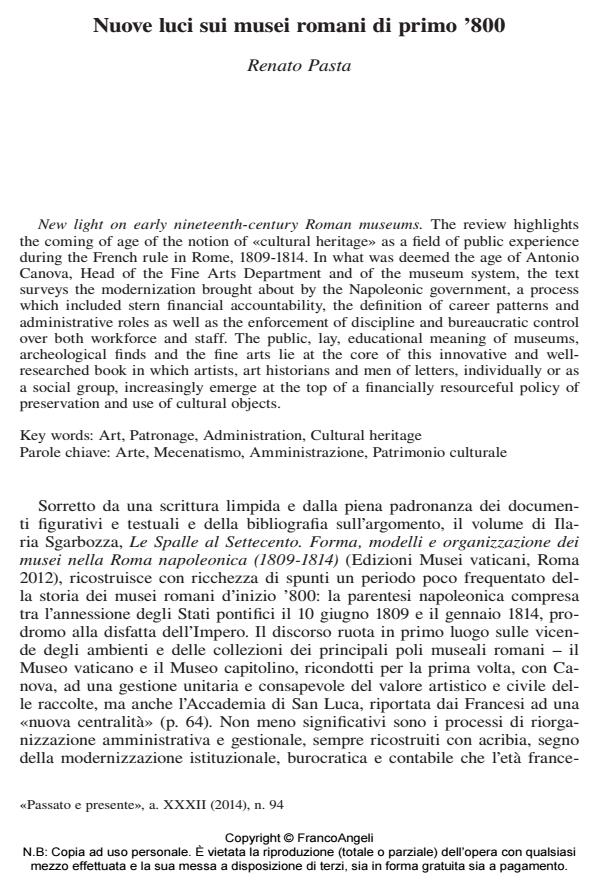Recensioni
Journal title PASSATO E PRESENTE
Author/s A cura della Redazione
Publishing Year 2015 Issue 2015/94
Language Italian Pages 31 P. 127-157 File size 194 KB
DOI 10.3280/PASS2015-094008
DOI is like a bar code for intellectual property: to have more infomation
click here
Below, you can see the article first page
If you want to buy this article in PDF format, you can do it, following the instructions to buy download credits

FrancoAngeli is member of Publishers International Linking Association, Inc (PILA), a not-for-profit association which run the CrossRef service enabling links to and from online scholarly content.
New light on early nineteenth-century Roman museums. The review highlights the coming of age of the notion of «cultural heritage» as a field of public experience during the French rule in Rome, 1809-1814. In what was deemed the age of Antonio Canova, Head of the Fine Arts Department and of the museum system, the text surveys the modernization brought about by the Napoleonic government, a process which included stern financial accountability, the definition of career patterns and administrative roles as well as the enforcement of discipline and bureaucratic control over both workforce and staff. The public, lay, educational meaning of museums, archeological finds and the fine arts lie at the core of this innovative and wellresearched book in which artists, art historians and men of letters, individually or as a social group, increasingly emerge at the top of a financially resourceful policy of preservation and use of cultural objects.
Twentieth-century family. The review examines the ways in which Ginsborg analyses the politics of the family in five revolutionary and/or dictatorial states (Russia, Turchia, Spagna, Italia, Germania) from the point of view of the relationship, always ambivalent, between family and State. Seen as the vehicle through which social change could be realized, under the pressures of the State the family certainly changed, but it also defended itself from the incursions of reforming politics, thus demonstrating notable qualities of adaptability. The central theme of the book is, in fact, the capacity of the family to survive not only the political and economic crises but also the policies of family reform, not always welcomed. Here, as a way of interpreting the survival of the family in adverse circumstances, the review introduces the concept of «navigation» - that is, the strategy that permits individuals and families to exploit all available opportunities to their advantage, despite the repressive framework. Finally a comment is made on the different behaviour of families in times of revolution and political crisis and of those of present-day western families, often seen to be on the verge of dissolution.
Fascism in the eyes of new generations of historians. Gabriele Turi reviews the issue that the journal of the Fondazione Istituto Gramsci, «Studi storici» devoted at the beginning of 2014 to Fascismo: itinerari storiografici da un secolo all’altro (Fascism: historiographical trends from one century to another). The idea of giving voice to the new generations of historians who emerged after the fall of the Berlin Wall, freer from ideological constraints, seems promising: in the last twenty years, the scope of the research on Italian fascism has broadened and has become more varied, leading to excellent outcomes especially when the research projects adopted a multidisciplinary approach and when they focused on centreperiphery relationships. Nonetheless, it is also evident that the new generations do no longer deal with those general problems on which earlier debates focused (coercion and consensus, continuity and rupture of fascism in the history of Italy) and a comparative approach, removing therefore Italian fascism from the wider European context. < br/>Modernity and nation in the Italian mountains. In recent years, the Italian mountains, especially the Alps, have been the subject of several historical studies. In his book A rugged nation, Marco Armiero analyses the relationship of reciprocal construction between the Italian mountains and the Unitarian state. In his research, the author examines the «mutual constituency of imagined communities and constructed natures» through some categories rarely used in Italian historiography, such as «environmental justice» and «wilderness».
Keywords: Art, Patronage, Administration, Cultural heritage / Family, Revolution, Dictatorship, Reform, Survival, Navigation / Historiography, Studi storici (journal), Fascism, Generations of historians, Italy / Environmental history, Modern Italy, Mountains
A cura della Redazione, Recensioni in "PASSATO E PRESENTE" 94/2015, pp 127-157, DOI: 10.3280/PASS2015-094008